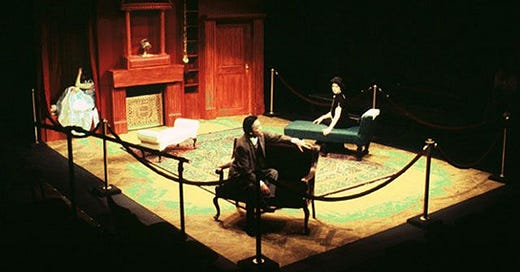As a college freshman taking a French class, we read Jean-Paul Sartre's brilliant play, "Huis Clos in French or No Exit." Aside from discussing the meaning of this play, I was intrigued. Here are three souls locked into a room, hell, with no exit. There are no windows or doors. Punishment must exist with each other for eternity. Three souls who cannot tolerate each other. I also had the privilege of seeing a live stage production of Huis Clos. It was brilliant.
Jean-Paul Sartre's "No Exit," originally titled "Huis Clos" in French, is a seminal work in existentialist literature and drama. Premiering in 1944 during the German occupation of France, this play is a profound exploration of human freedom, responsibility, and the nature of existence.
The theme of No Exit is the power of "the others" to deny our autonomy. Sarte believed the essence of existence is the freedom to make choices. If others persuade us to believe we have no choice, we deny the essence of our existence.
"No Exit" is a one-act play set entirely in a single room in hell. The story revolves around three deceased characters: Garcin, Inès, and Estelle. Each character enters the room expecting to face the tortures hell is famous for but finds themselves in a second empire-style drawing room. This setting, devoid of any expected infernal devices or demons, is the backdrop for the play’s psychological drama.
The crux of "No Exit" lies in the dynamic between the three characters, who are gradually revealed to be each other's torturers. Sartre uses this setup to explore his philosophical ideas, particularly the concept of existentialism. This philosophy posits that existence precedes essence, meaning that individuals first exist and then define themselves through their actions and choices. The characters in "No Exit" are forced to confront the choices they made during their lives and the subsequent consequences.
Garcin, a pacifist and a journalist, is haunted by his act of cowardice and betrayal. Inès, a manipulative and cruel individual, torments Garcin and Estelle with her blunt honesty. Estelle, obsessed with her appearance and superficiality, cannot escape her need for validation, especially from male figures. Their interactions underscore Sartre’s notion that “Hell is other people.” It is the idea that the relentless gaze and judgment of others can be a source of unending torment, especially when it forces self-reflection and realization of one’s flaws and pretensions.
Sartre’s play also delves into bad faith. In this concept, one deceives oneself to escape the anguish associated with the freedom of choice and responsibility. The characters in "No Exit" exhibit bad faith by refusing to accept the meaning of that line, which is the truth of their actions and authentic selves. Instead, they continuously attempt to create narratives that justify their behaviors, evading the responsibility of their freedom.
Another key aspect of "No Exit" is the absence of a traditional hellish setting. Sartre subverts the typical notion of hell, using the setting to symbolize the characters' internal states. The lack of physical torture devices and a room that initially seems benign highlights the psychological and existential torment faced by the characters.
In summary, Jean-Paul Sartre's "No Exit" profoundly explores existentialist themes. It challenges the audience to confront the nature of freedom, the responsibility of choice, and the impact of others on one's self-identity. The play is a stark reminder of the complexities of human nature and the existential dilemmas that come with awareness and freedom. It remains a cornerstone of existentialist literature, resonating with audiences for its deep philosophical insights and portrayal of the human condition.
In sum, hell is not fire and brimstone. Instead, hell is other people.





Considering there is no “I” without “other” and both are the complex collision of our nature/nurture equation this work of art is timelessly important! How much of what we’ve become is “our choice” and how much has been driven by unconscious dynamics we did not choose is still up for debate. As for the idea of “Hell” that is relative to some degree yet painfully obvious in many circumstances; intractable pain prolonged over time, extreme involuntarily isolation, etc.
That “sense of I” that is integrally entwined with the “sense of other(we)” is sometimes a choice and sometimes not. Does one choose the “Hell of an abusive childhood?” Does the adult that is grappling with PTSD without knowing or understanding it choose the “Reoccurring Hell” that continues to show up in their lives?
IMO, and life experiences, most of what we consider Hell is unconsciously chosen and that cycle can only be broken when we bring the depths of our subjective interiors to the surface of our awareness in which it can be objectified and transcended(healed). Free will is not truly activated until the depths of the complexities of our beings come into the fullest expanded awareness possible and even then it doesn’t end…